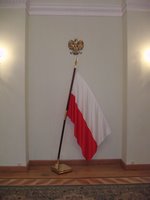 Łukasz Skapski, invited to an event dedicated to artists in the Presidential Palace, submitted in the chancellery a letter to Aleksander Kwaśniewski. He received no reply.
Łukasz Skapski, invited to an event dedicated to artists in the Presidential Palace, submitted in the chancellery a letter to Aleksander Kwaśniewski. He received no reply.Cracow, 14th February 2005
Mr. Aleksander Kwaśniewski
President of the Republic of Poland
Dear Mr. Kwaśniewski
In recent years, my colleagues and I have represented Poland, or – strictly speaking - Polish art, in numerous exhibitions in Europe, and lately in France during celebrations of the Polish Year. I have attended these events not only as an artist, but also as a Polish citizen, a person living in this country, and a representative of Polish culture.
This has inevitably made me wonder about the meaning of the phrase “a representative of Polish culture,” and, consequently, reflect on the advancing erosion of such values as “nation,” “patriotism,” “good citizenship,” “reason of state,” and the ensuing national pride. One could ask, does a nation need to be proud? I believe that pride is necessary for the proper functioning of society. The lack of it results in dangerous substitute phenomena that take its place, such as chauvinism, xenophobia, or nationalism.
What basis can there be for national pride in contemporary Poland? I find it much easier to define the reasons why Polish people cannot, or – at least – should not, be proud.
Being a Polish citizen, one cannot be proud of:
- honesty of compatriots (deceit and theft are commonplace),
- education of society (the majority of Poles do not understand what they read),
- social awareness (social acceptance of corruption, political egoism influencing political choices),
- good organization of social life (no sense of community apart from corporate identity),
- citizen society (social and political apathy, no sense of responsibility for the country),
- quality of work (depravity reaching back to the Partitions in the 18th century, strengthened during the Second World War and the communist period),
- social tolerance (xenophobia, provincial chauvinism),
- national features (cunning, envy).
Polish legislature and administration do not give reasons to be proud, either.
I personally doubt if one can take pride in:
- Polish law (inconsistent, faulty and ineffectively enforced),
- judiciary (political, incompetent or corrupted),
- effectiveness of prosecution (see above),
- tax system (harmful to enterprise),
- economic politics (high budget deficit, no rational plans for the future),
- privatization (carried out fraudulently),
- national economy (badly administrated, costly, a base of posts for the ruling party),
- enterprise development (hampered by bad law),
- law and Office’s respect for private possession (arbitrary),
- state administration (incompetent, too big, nepotistic, a base of posts for the ruling party),
- members of parliament (badly educated, rude, pursuing their private interests, interested mainly in their salaries if not bribes),
- politicians (arrogant manners both on the left and the right sides, corrupted, taking Poland as electoral loop),
- civil service (if it at all exists, partiality),
- social control over politicians (none),
- national health service (incompetent, corrupted),
- education system (low quality of teaching, negative selection of teachers because of low pay),
- higher education (archaic curricula, poor and corrupted staff employed for life),
- Polish science (underfinanced, contributory achievements),
- armed forces (incapable of ensuring the country’s security),
- security forces (partial, used for the benefit of the ruling parties),
- the country’s beauty (ugly and chaotic buildings which I wouldn’t dare call architecture, no urban planning),
- transport (deplorable state of roads and railway),
- national mass media (partial, unreliable, and commercialized public television),
- Polish church (extremely conservative, often openly anti-Semitic).
I cannot assume that Polish authorities, including President, do not appreciate the problems listed above which cause any mention of Polish national pride to sound like a joke. I wish I could trust that the authorities will take action to improve the condition of the state in every realm that they are responsible for.
In my creative work, I like to refer to the world surrounding me, which is why, as an artist, I am posing this question: What can a contemporary Pole be proud of?
Having accepted your invitation to meet culture producers, I would like to take the opportunity and ask you, Mr. President, to dispel as the Head of State and the representative of the Nation my doubts.
There is a notion in contemporary art, which I agree with, that it is the artist’s duty to raise social awareness in order to improve the world. I dare suggest that you, Mr. President, temporarily assume the role of an artist and join my critical art project. I would like to ask you to compile a list of more or less important reasons for Polish people to be proud of being Polish citizens, members of the Nation, of their country.
Yours sincerely,
Łukasz Skąpski
The project included the letter I submitted in the chancellery, to which there was no reply. I had this idea when Azorro got invited to the Presidential Palace to meet culture producers. I wrote a letter to the President of the Republic of Poland. I meant to hand it personally but I didn’t get a chance. I left it in the correspondence register in the chancellery. There was no reply.
Łukasz Skąpski, authorial comment, 2006
Bibliography
Łukasz Skąpski, „Grey Area“ catalogue, Bunkier Sztuki, Krakow, 2006
No comments:
Post a Comment